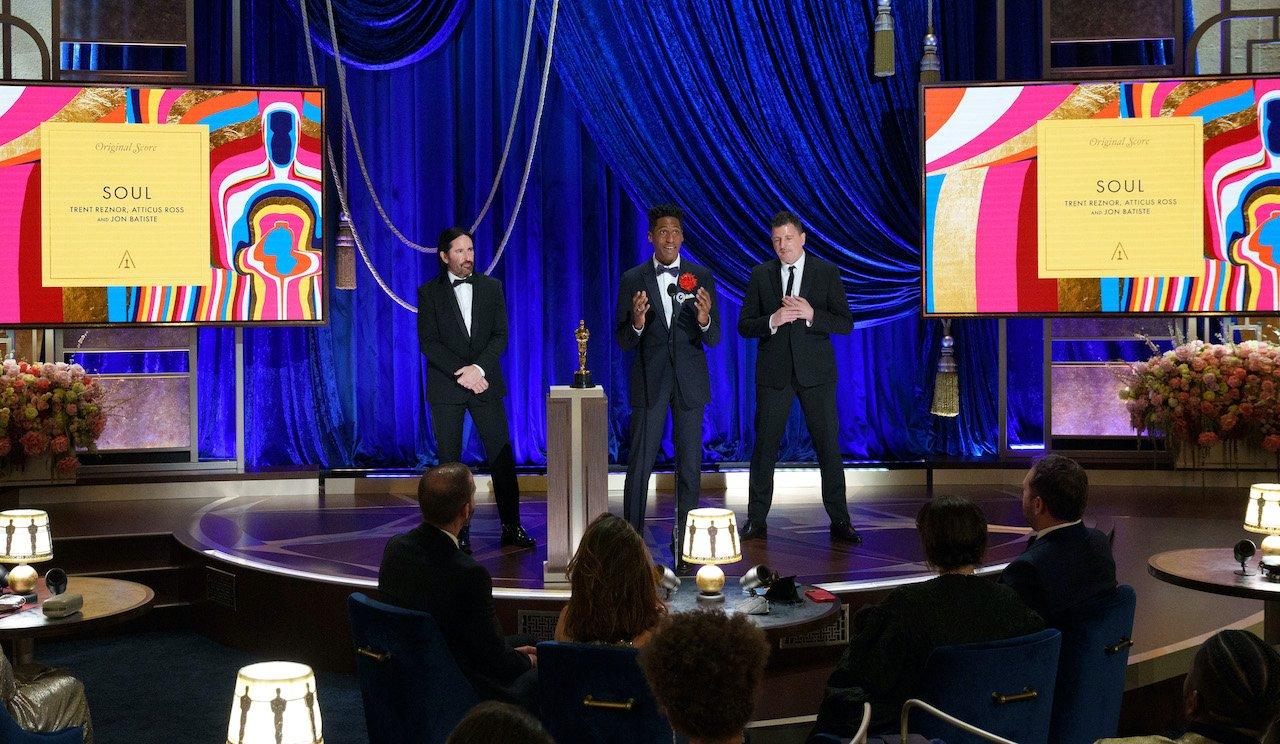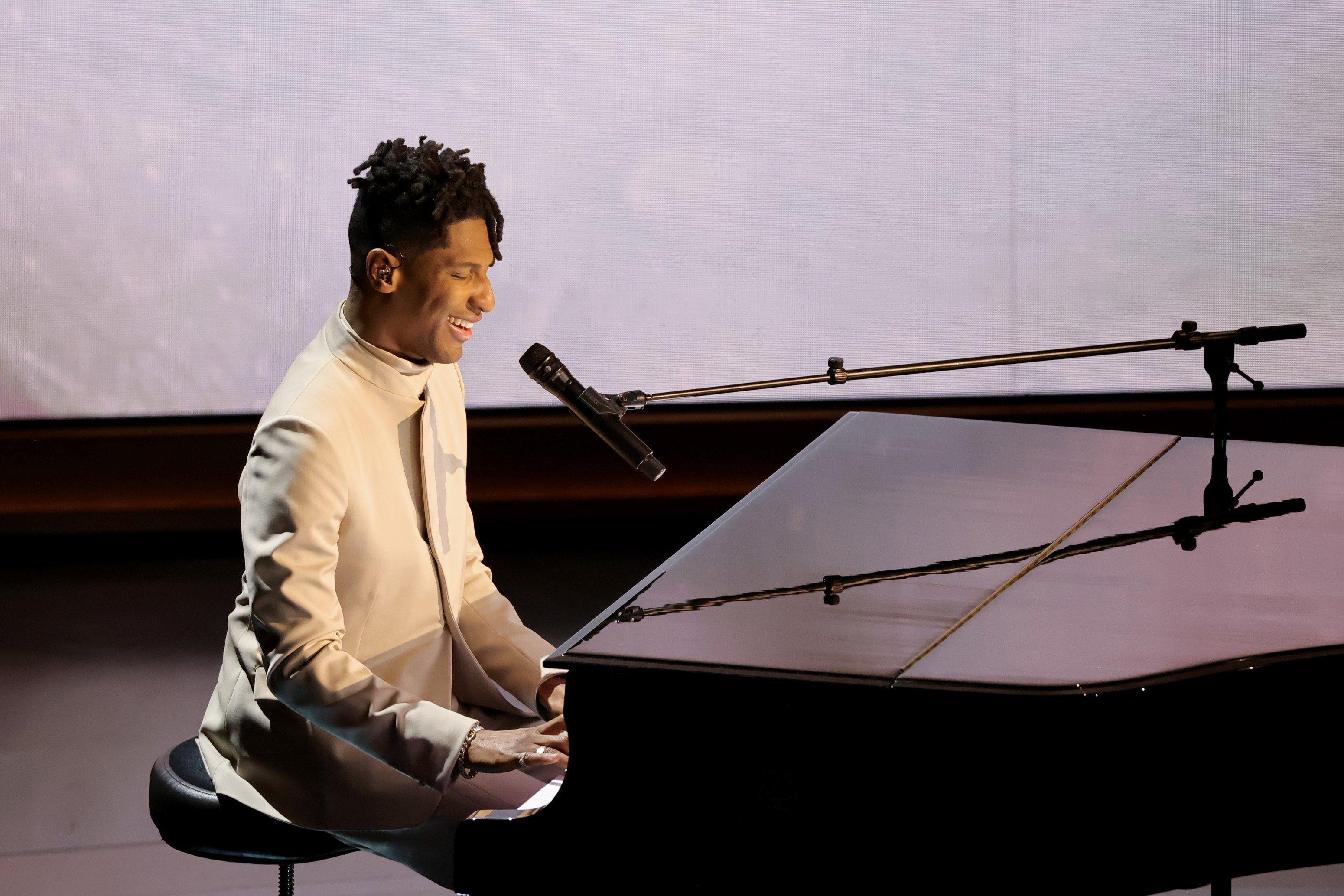Photo: Todd Wawrychuk/A.M.P.A.S. via Getty Images

(L-R) Trent Reznor, Jon Batiste, and Atticus Ross accept the Music (Original Score) award at the 2021 Oscars
news
Disney And Pixar's 'Soul' Wins Best Original Score At 2021 Oscars
Disney and Pixar's love letter to jazz, 'Soul,' which features music by Trent Reznor, Atticus Ross and Jon Batiste, won Best Original Score at the 2021 Oscars
Disney and Pixar's Soul, which follows a jazz musician in the ether as he attempts to return to Earth for the gig of a lifetime, won Best Original Score at the 2021 Oscars.
The film was directed by Pete Docter and Kemp Powers and featured music by Trent Reznor, Atticus Ross and Jon Batiste, with consultation by Herbie Hancock, Terri Lyne Carrington and other jazz luminaries.
Batiste delivered a heartfelt speech about the power of music as it relates to the Divine—and how the same 12 notes are shared by nearly all artists throughout millennia.
<style>.embed-container { position: relative; padding-bottom: 56.25%; height: 0; overflow: hidden; max-width: 100%; } .embed-container iframe, .embed-container object, .embed-container embed { position: absolute; top: 0; left: 0; width: 100%; height: 100%; }</style><div class='embed-container'><iframe src='https://www.youtube.com/embed/ZODqBZke7UU' frameborder='0' allowfullscreen></iframe></div>
Keep watching this space at GRAMMY.com for more news on Oscars 2021 winners and performers.
Disney And Pixar's Soul Wins Best Animated Feature Film At 2021 Oscars

Photo: Paul Natkin/Getty Images
list
8 Ways Sade's 'Diamond Life' Album Redefined '80s Music & Influenced Culture
As Sade's masterpiece 'Diamond Life' turns 40, see how the group's debut pushed R&B forward and introduced them as beloved elusive stars.
"I only make records when I feel I have something to say," Sade Adu asserted in 2010 upon the highly anticipated release of Sade's GRAMMY-winning Soldier of Love album, which arrived after a 10-year hiatus. "I'm not interested in releasing music just for the sake of selling something. Sade is not a brand."
This lifetime of dedication toward achieving musical excellence helped Sade — vocalist Adu, bassist Paul S. Denman, keyboardist Andrew Hale, and guitarist/saxophonist Stuart Matthewman — gain prominence in the mid-80s, also garnering enormous respect from fans, critics, and peers alike. Formed in 1982, the English band is one of the few acts that can still be met with a hungry audience after disappearing from the spotlight for multiple years.
In an industry where churning out a new body of work is expected every couple of years, the four meticulous members of Sade move on their own time, putting out a mere six studio albums since 1984. Every project becomes more exquisite than the last, but it all began 40 years ago with Sade's illustrious debut album, Diamond Life. Ubiquitous hits like "Smooth Operator" and "Your Love Is King" appealed to listeners young and old — offering a unique blend of R&B, jazz, soul, funk, and pop that birthed a new sound and forced the industry to take notes from the jump.
As Sade's Diamond Life celebrates a milestone anniversary, here's a look at how the album helped push R&B forward, and why it's just as relevant today.
It Helped Set Off The "Quiet Storm" Craze
By mid-1984, Michael Jackson, was riding high off of winning the most GRAMMYs in a single night (including Album Of The Year) for his blockbuster album Thriller, Madonna celebrated her first top 10 hit with "Borderline," and Prince's Purple Rain was just days away from its theatrical release. Duran Duran, Culture Club, Billy Idol, and the Police were mainstays, while "blue-eyed soul" in particular had also hit an all-time high thanks to Hall and Oates, Wham, Simply Red, and others. What's more, many Black artists like Lionel Richie and Whitney Houston opted for more of a pop sound to appeal to broader audiences during MTV's golden era.
Diamond Life was refreshing at the time, as it fully embraced soul and R&B. The album offered a chic sophistication amid the synth-heavy pop and rock music that ruled the charts.
Singles like "Your Love Is King" and "Smooth Operator" introduced jazz elements into mainstream radio. In turn, Sade helped usher in the "quiet storm" genre — R&B music at its core, with strong undertones of jazz for an ultra-smooth sound. Sade and Diamond Life also laid some of the groundwork for neo-soul, which saw a surge in the '90s à la Lauryn Hill, Maxwell, and Erykah Badu.
It Made GRAMMY History
In the 65-year history of the GRAMMYs, a small number of Nigerian artists, including Burna Boy and Tems, have won a golden gramophone. In 1986, a then 27-year-old Sade Adu made history as the first-ever Nigerian-born artist to win a GRAMMY when she and her band was crowned Best New Artist at the 29th GRAMMYs. Still, Billy Crystal and Whoopi Goldberg had to accept the award on Sade's behalf — signaling Adu's elusive nature as she rarely attends industry events or grants interviews.
Since then, Sade has gone on to earn three more GRAMMYs, including Best Pop Vocal Album in 2001 for their fifth studio album, Lovers Rock. The win signified their staying power in the new millennium.
It Birthed The Band's Signature Song…
While Diamond Life spawned timeless hits like "Your Love Is King" and "Hang On to Your Love," "Smooth Operator" became the album's highest-charting single — and remains the most iconic song in their catalog. The seductive track about a cunning two-timer propelled the band into international stardom: "Smooth Operator" skyrocketed to No. 5 on the Billboard Hot 100 and hit No. 1 on the Adult Contemporary chart.
Even non-Sade fans can identify "Smooth Operator" in an instant, from Adu's unmistakable vocals to that now-iconic instrumental saxophone solo. As of press time, it boasts over 400 million Spotify streams alone, and has remained a set list staple across every one of Sade's tours.
…And It Houses Underrated Gems
"Smooth Operator" may be Sade's commercial classic, but deep cuts like "Frankie's First Affair," "Cherry Pie," and "I Will Be Your Friend" are fan favorites that embody the band's heart and soul.
"Frankie's First Affair" offers a surprisingly enchanting take on infidelity: "Frankie, didn't I tell you, you've got the world in the palm of your hand/ Frankie, didn't I tell you they're running at your command." And, it's impossible to resist the funky groove that carries standout track "Cherry Pie," which served as a catalyst for some of Sade's later, more dance-oriented hits, including "Never As Good As the First Time" and "Paradise." Some of Sade's most poignant statements about lost love, including "Somebody Already Broke My Heart" from 2000's Lovers Rock, can be traced back to "Cherry Pie."
Diamond Life's penultimate song, "I Will Be Your Friend," offers both solace and companionship — another recurring theme throughout Sade's music, from 1988's "Keep Looking" to 2010's "In Another Time."
It Was The Best-Selling Debut Album By A British Female Singer For More Than Two Decades
Sade has sold tens of millions of albums worldwide, but Diamond Life remains the band's most commercially successful LP with over 7 million copies sold. Most of Sade's other platinum-selling LPs, including Diamond Life's follow-up, 1985's Promise, boast sales between four and six million copies.
The 7 million feat helped Sade set the record for best-selling debut album by a British female singer. She held the title for nearly 25 years until Leona Lewis' 2008 album Spirit, which has sold over 8 million copies globally.
It Introduced Sade Adu As A Style Icon
When we first met Adu, her signature aesthetic consisted of a long, slicked-back ponytail, red lip, and gold hoops. Sade's impeccable style is front and center in early videos like "When Am I Going to Make a Living," in which she sports an all-white ensemble paired with a pale gray, ankle-length trench coat and loafers.
Adu rocked the model off-duty style long before it became a trend. Her oversized blazers, classic trousers, and head-to-toe denim looks were as effortless as they were chic and runway-ready — proving that less was more amid the decade of excess.
"It's now so acceptable to be wacky and have hair that goes in 101 directions and has several colours, and trendy, wacky clothes have become so acceptable that they're… conventional," Adu, who briefly worked as a fashion designer and model before pursuing music, told Rolling Stone in 1985. "I don't like looking outrageous. I don't want to look like everybody else."
It Shined A Light On Larger Societal Issues
While most of Diamond Life leans into love's ebbs and flows, a handful of tunes deal with financial strife coupled with a dose of optimism, as evidenced by "When Am I Going to Make a Living" and "Sally." The latter song characterizes the Salvation Army as a young charitable woman: "So put your hands together for Sally/ She's the one who cared for him/ Put your hands together for Sally/ She was there when his luck was running thin."
Meanwhile, Adu, a then-starving artist, scribbled down portions of "When Am I Going to Make a Living" on the back of her cleaning ticket. The soul-stirring "We are hungry, but we won't give in" refrain emerges as a powerful mantra in the face of adversity and still holds relevance in 2024. Similar themes appear throughout Sade's later work, including unemployment ("Feel No Pain"), unwanted pregnancy ("Tar Baby"), survival ("Jezebel"), prejudice ("Immigrant"), and injustice ("Slave Song").
Diamond Life closer "Why Can't We Live Together" is a well-done cover of Timmy Thomas' 1972 hit about the staggering Vietnam War deaths. The band wisely doesn't veer too far from the original recording, but Adu's distinctive contralto voice brings a haunting quality that's reminiscent of Billie Holiday.
It Ignited The Public's Ongoing Fascination With Sade Adu
Since 1984, Sade has only released six studio albums, and a remarkable 14 years have passed since the group's last offering, 2010's Soldier of Love. Ironically, that scarcity — both in terms of music and access to the artist — has actually added to Adu's appeal. Case in point: Sade's sold-out Soldier of Love Tour grossed over $50 million in 2011, and the band still brings in close to 14 million monthly listeners on Spotify.
Adu's striking beauty, mysterious persona, and knack for letting her music do all the talking has earned the admiration of her peers across genres and generations. Everyone from Beyoncé to Kanye West to Snoop Dogg have sung her praises. Drake even has two portrait-style tattoos of the singer on his torso. Prince reportedly described 1988's "Love Is Stronger Than Pride" as "one of the most beautiful songs ever." Metalheads Chino Moreno of the Deftones and Greg Puciato of the Dillinger Escape Plan have also cited Adu as inspiration — showing that her influence runs far and wide.
In 2022, reports circulated that Sade was recording new music at Miraval Studios in France. But upon Diamond Life's 40th anniversary, "Flower of the Universe" and "The Big Unknown" from the respective soundtracks to 2018 films A Wrinkle in Time and Widows stand as Sade's latest releases.
Whether fans get new music anytime soon remains to be seen, but the impressive repertoire of Adu, Denman, Hale, and Matthewman is one that aims to be truth-seeking and inspiring while exploring life's peaks and valleys. Diamond Life in particular holds up as one of the purest representations of the group's creative legacy, both commercially and musically.
From quadruple platinum status to resonating with several generations, Diamond Life will forever stand as a remarkable debut — one that continues to influence music in a multitude of ways.
Latest News & Exclusive Videos

2024 Paris Olympics Opening Ceremony: Watch Celine Dion, Lady Gaga, Gojira & More Perform

Ice Spice Is The Drill Queen On 'Y2K!': 5 Takeaways From Her Debut Album

New Music Friday: Listen To New Songs From Halsey, MGK And Jelly Roll, XG & More

Watch Young MC Win Best Rap Performance In 1990

The Red Clay Strays Offer A New Kind Of Religion With 'Made By These Moments'

Photo: Matt Winkelmeyer/Getty Images
video
GRAMMY Rewind: Watch Jon Batiste’s Encouraging Speech For His 2022 Album Of The Year Win For 'We Are'
Jon Batiste accepts the Album Of The Year award for We Are, a win that he dedicated to "real artists, real musicians."
Jon Batiste walked into the 2022 GRAMMYs with a whopping 11 nominations, making him the most recognized artist of the evening. By the end of the night, he received five GRAMMYs for Best American Roots Performance, Best American Roots Song, Best Score Soundtrack For Visual Media, Best Music Video, and the highly coveted Album Of The Year.
In this episode of GRAMMY Rewind, watch Batiste take the stage to accept the award for Album Of The Year for his sixth studio album, We Are
Batiste began his praises by acknowledging God: "I just put my head down and work on the craft every day. I love music, he said. "I've been playing since I was a little boy. It's more than entertainment for me — it's a spiritual practice." He also thanked the "many people that went into making this album," including his grandfather, nephew, father, and executive producer, Ryan Lynn.
"This [award] is for real artists, real musicians. Let's just keep going. Be you! That's it. I love you even if I don't know you," Batiste cheered.
Press play on the video above to hear Jon Batiste's complete acceptance speech and check back to GRAMMY.com for more new episodes of GRAMMY Rewind.

Photo: Jeff Kravitz/FilmMagic
video
Where Do You Keep Your GRAMMY?: Autumn Rowe Revisits Her Unexpected Album Of The Year Win With Jon Batiste
Acclaimed songwriter Autumn Rowe reveals the inspirational location where her Album Of The Year golden gramophone resides, and details the "really funny way" she first met Jon Batiste.
Ever since Autumn Rowe won a GRAMMY in 2022, it's been her biggest motivation. That's why the musical multi-hyphenate keeps the award nestled in her writing room — to keep her creative juices flowing.
"It reminds me that anything is possible," she says in the latest episode of Where Do You Keep Your GRAMMY?
Rowe won her first-ever career GRAMMY in 2022 with an Album Of The Year award for Jon Batiste's We Are. "It was very stressful," she recalls with a laugh.
"Right before they announced Album Of The Year, the pressure started getting to me," Rowe explains. "Album Of The Year is the biggest possible award you can win. So, I'm like, 'We didn't win any of these [categories], how are we going to win the biggest award?"
The win also taught her one unforgettable, valuable lesson: "We matter. The music matters. Everything matters. We just have to create it. If there isn't space for it, we have to make space for it. Don't wait for something to open."
Rowe says she grew up "super dirt poor" and never even had the opportunity to watch the awards ceremony on television. "To be a GRAMMY winner means it is possible for everyone," she declares.
Press play on the video above to learn more about the backstory of Autumn Rowe's Album Of The Year award, and remember to check back to GRAMMY.com for more new episodes of Where Do You Keep Your GRAMMY?

Photo: Kevin Winter/Getty Images
video
2024 Oscars: Watch Jon Batiste Perform A Poignant Rendition Of "It Never Went Away" From The Documentary Film 'American Symphony'
At the 2024 Academy Awards, five-time GRAMMY winner Jon Batiste performed a soul-nourishing version of "It Never Went Away" from ‘American Symphony,’ the acclaimed documentary film about his and wife Suleika Jaouad’s personal and creative lives.
At the 2024 Oscars on March 10, five-time GRAMMY winner and 20-time nominee Jon Batiste took the stage for a scintillating version of his co-write with Dan Wilson, "It Never Went Away."
For said performance, the multimedia phenom kept the proceedings spare and probing, letting his iridescent piano and singular pipes do the heavy lifting. Watch it above.
"It never went away/Every time I see your face," Batiste sang, in a commensurately understated, off-white stage outfit and backdrop. "The feeling's just the same/ It's never goin' away."
"It Never Went Away" was featured in the acclaimed 2023 documentary American Symphony, about his and his wife author Suleika Jaouad's personal and creative development — under the spectre of cancer and an impending debut at Carnegie Hall, of the symphony of the same name.
2024 Oscars: Watch Performances & Highlights
2024 Oscars: Watch Billie Eilish And FINNEAS Perform A Heartrending Version Of "What Was I Made For?" From The Motion Picture 'Barbie'
2024 Oscars: Watch Ryan Gosling And Mark Ronson Perform A Soaring, Hilarious Version Of "I'm Just Ken" From The Motion Picture 'Barbie'
2024 Oscars Red Carpet: Music Icons & Artists Shine Including Billie Eilish, Mark Ronson, Danielle Brooks & More
2024 Oscars: Billie Eilish and FINNEAS Win Best Original Song For "What Was I Made For?" From The Motion Picture 'Barbie'
2024 Oscars: Watch Becky G Perform "The Fire Inside" From The 2023 Comedy-Drama ‘Flamin’ Hot’
2024 Oscar Nominees Who Have Won A GRAMMY: Billie Eilish, Martin Scorsese & More
2024 Oscars: Watch Jon Batiste Perform A Poignant Rendition Of "It Never Went Away" From The Documentary Film 'American Symphony'
2024 Oscars: Ludwig Goransson's Masterful Composition for 'Oppenheimer' Wins Best Original Score
2024 Oscars: Watch Scott George and the Osage Singers Perform "Wahzhazhe (A Song For My People)" From 'Killers Of The Flower Moon'
'The Last Repair Shop' Filmmakers Share Behind-The-Scenes Stories About Oscar-Winning Documentary
How Afrobeats Star Bobi Wine Took On Uganda’s Dictatorship
"It was very complicated from a producing point of view to navigate the puzzle of Jon's insane life, and then trying to find our way into the hospital, and then back out again, and back in again," American Symphony director Matthew Heineman said last year at a live interview covered by GRAMMY.com.
In the same conversation Heineman aptly described the overall process as reflecting "the symphony of life that we witnessed over the past year."
Keep checking this space for more updates on the 2024 Oscars — including GRAMMY winners and nominees who are featured during the big night!
Inside American Symphony: 5 Revelations About The Jon Batiste Documentary
